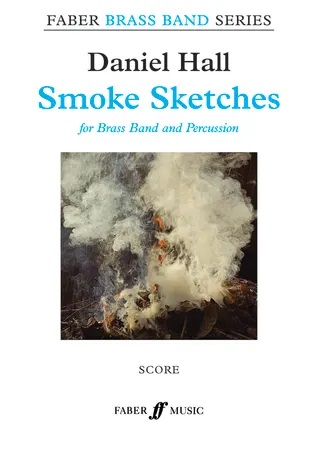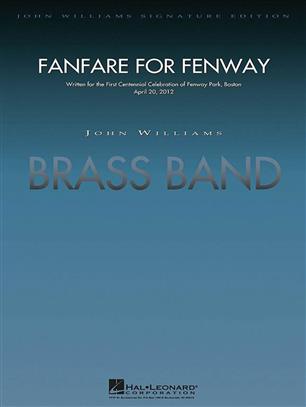Results
-
 £29.99
£29.99Titan's Progress (Brass Band - Score Only)
Commissioned by Austria's leading brass band, Brass Band Oberoesterreich, Titan's Progress is a series of descriptive, virtuoso episodes based on the principal character of the novel by Jean Paul. This was also the original subject of Mahler's Symphony No.1, from which Hermann Pallhuber derives much of his material. The work has proved an exceptionally popular test piece all over the world.Titan's Progress was the selected test piece for the British Open Brass Band Championship, held at Symphony Hall, Birmingham on Saturday 12th September 2009.Suitable for Championship BandsDuration: 17 minutes
Estimated dispatch 7-14 working days
-
 £65.00
£65.00Smoke Sketches (Brass Band - Score and Parts)
Smoke Sketches is Daniel Hall's first original work to be published in the Faber Music Brass Band Series. Daniel is one of the most gifted of the rising generation of composers writing for brass bands. Smoke Sketches was composed at the invitation of Brass Bands England for the Intermediate Section of the 2017 National Youth Brass Band Championships of Great Britain.This colourful, jazzy suite draws inspiration from the ancient art of gazing into smoke from fire to find stories through the act of divination. Into the Blaze suggests someone briskly fire-walking, barefoot, with unexpected sparks fizzling from the ground. A Lonesome Ember captures the fleeting life of a small ember, beginning insignificantly and gradually evolving into a larger being before disappearing into ash, while Spark of Light bristles with life and energy.Band Grade 3/4, duration 8 minutes.
Estimated dispatch 7-14 working days
-
 £11.99
£11.99Smoke Sketches (Brass Band - Score only)
Smoke Sketches is Daniel Hall's first original work to be published in the Faber Music Brass Band Series. Daniel is one of the most gifted of the rising generation of composers writing for brass bands. Smoke Sketches was composed at the invitation of Brass Bands England for the Intermediate Section of the 2017 National Youth Brass Band Championships of Great Britain.This colourful, jazzy suite draws inspiration from the ancient art of gazing into smoke from fire to find stories through the act of divination. Into the Blaze suggests someone briskly fire-walking, barefoot, with unexpected sparks fizzling from the ground. A Lonesome Ember captures the fleeting life of a small ember, beginning insignificantly and gradually evolving into a larger being before disappearing into ash, while Spark of Light bristles with life and energy.Band Grade 3/4, duration 8 minutes.
Estimated dispatch 7-14 working days
-
 £15.99
£15.99Beecher Variations (Brass Band - Score only)
In this beautiful composition, melodic fragments of the hymn tune Beecher are morphed into a series of variations, showing the melody in various moods from expressive, then quiet and soft, to bright and triumphant in the end. Written as a test piece in the 4th division for the Dutch Brass Band Championships in 2015, the music features challenging solo parts for cornet, soprano cornet, flugelhorn and euphonium. A great work for the concert or contest stage!Duration: 12.00
Estimated dispatch 7-14 working days
-
 £33.10
£33.10Musica Religiosa (Brass Quintet)
The Obrasso Brass Quintet Series includes the following parts:Part 1 in BbPart 2 in BbPart 3 in Eb and FPart 4 in Bb TC and C BCPart 5 in Eb TC and C BC
Estimated dispatch 7-14 working days
-
 £25.20
£25.20Bethena (Brass Quintet)
The Obrasso Brass Quintet Series includes the following parts:Part 1 in BbPart 2 in BbPart 3 in Eb and FPart 4 in Bb TC and C BCPart 5 in Eb TC and C BC
Estimated dispatch 7-14 working days
-
 £33.10
£33.10Wedding Dreams (Brass Quintet)
The Obrasso Brass Quintet Series includes the following parts:Part 1 in BbPart 2 in BbPart 3 in Eb and FPart 4 in Bb TC and C BCPart 5 in Eb TC and C BC
Estimated dispatch 7-14 working days
-
 £25.20
£25.20But Not For Me (Brass Quintet)
The Obrasso Brass Quintet Series includes the following parts:Part 1 in BbPart 2 in BbPart 3 in Eb and FPart 4 in Bb TC and C BCPart 5 in Eb TC and C BC
Estimated dispatch 7-14 working days
-
 £72.99
£72.99Fanfare for Fenway (Brass Band - Score and Parts)
This spectacular tune from John Williams was originally written for the First Centennial Celebration of Fenway Park in Boston. It was transcribed for brass band by Stephen Bulla for the exclusive John Williams Signature Edition series, approved by John Williams himself. A fancy opener for any occasion!
Estimated dispatch 7-14 working days
-
 £25.20
£25.20Thula Baba (Brass Quintet)
The Obrasso Brass Quintet Series includes the following parts:Part 1 in BbPart 2 in BbPart 3 in Eb and FPart 4 in Bb TC and C BCPart 5 in Eb TC and C BC
Estimated dispatch 7-14 working days
